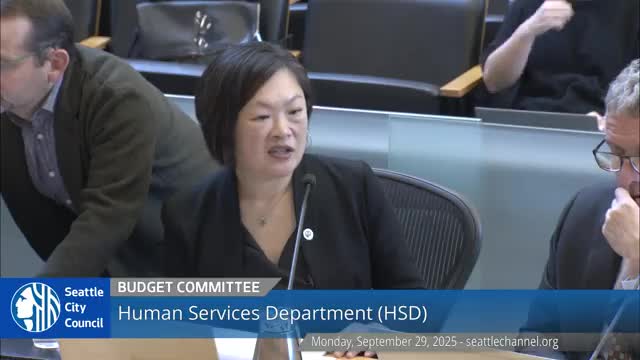Seattle Council Reviews Increased Budget for Homelessness and Food Security Programs
September 30, 2025 | Seattle, King County, Washington
This article was created by AI summarizing key points discussed. AI makes mistakes, so for full details and context, please refer to the video of the full meeting. Please report any errors so we can fix them. Report an error »

Seattle City officials are taking significant steps to address homelessness in the region, as highlighted during the Select Budget Committee Session on September 29, 2025. The proposed budget for 2026 includes a substantial increase in funding for city-managed homelessness programs, rising from $12.67 million in 2024 to a proposed $36 million. This threefold increase aims to tackle the growing homelessness crisis, which currently affects over 16,000 individuals in King County.
During the meeting, council members expressed concerns about the effectiveness of current spending on homelessness initiatives. Questions were raised regarding the tangible outcomes of the investments, such as the number of housing units created and the success of programs designed to transition individuals off the streets. Council member Salman emphasized the need for accountability, urging city officials to demonstrate the return on investment for the substantial funds allocated to the King County Regional Homelessness Authority (KCRHA).
In response, city officials outlined plans to enhance shelter services, focusing on providing more desirable living conditions and comprehensive support for individuals experiencing homelessness. The budget reflects a commitment to expanding shelter capacity, including the introduction of non-congregate shelters that offer case management and housing navigation services. These efforts are modeled after successful programs like the STAR Center, which integrates medical and behavioral health support.
Despite the ambitious plans, challenges remain, particularly regarding the availability of land for new tiny home villages. City officials acknowledged the limited options for siting these structures and called for collaboration with private entities and community organizations to identify potential sites.
As Seattle moves forward with its budget proposals, the emphasis on accountability and effective outcomes will be crucial in addressing the homelessness crisis and ensuring that investments lead to meaningful improvements in the lives of those affected. The city is poised to take action, but the success of these initiatives will depend on ongoing evaluation and community engagement.
During the meeting, council members expressed concerns about the effectiveness of current spending on homelessness initiatives. Questions were raised regarding the tangible outcomes of the investments, such as the number of housing units created and the success of programs designed to transition individuals off the streets. Council member Salman emphasized the need for accountability, urging city officials to demonstrate the return on investment for the substantial funds allocated to the King County Regional Homelessness Authority (KCRHA).
In response, city officials outlined plans to enhance shelter services, focusing on providing more desirable living conditions and comprehensive support for individuals experiencing homelessness. The budget reflects a commitment to expanding shelter capacity, including the introduction of non-congregate shelters that offer case management and housing navigation services. These efforts are modeled after successful programs like the STAR Center, which integrates medical and behavioral health support.
Despite the ambitious plans, challenges remain, particularly regarding the availability of land for new tiny home villages. City officials acknowledged the limited options for siting these structures and called for collaboration with private entities and community organizations to identify potential sites.
As Seattle moves forward with its budget proposals, the emphasis on accountability and effective outcomes will be crucial in addressing the homelessness crisis and ensuring that investments lead to meaningful improvements in the lives of those affected. The city is poised to take action, but the success of these initiatives will depend on ongoing evaluation and community engagement.
View full meeting
This article is based on a recent meeting—watch the full video and explore the complete transcript for deeper insights into the discussion.
View full meeting
